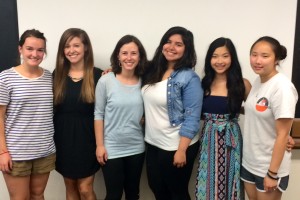
Social Workers in Classroom participants with officers Maggie Bishop and Galina Melamed (second and third from the left).
A new student-led program aimed at helping provide training and support to graduate students in the School of Social Welfare was launched this year.
Social Workers in Classrooms was created after a group of graduate students in the School of Social Welfare realized that many school social workers enter the educational system without an understanding of the inner workings of a classroom.
Run by graduate students Maggie Bishop and Galina Melamed, Social Workers in Classrooms consists of in-classroom education, training and pairing graduate students and undergraduates from the School of Social Welfare with teachers in underserved K-12 public schools in San Francisco and the East Bay.
As a fourth grade teacher in Richmond, Social Welfare graduate student Maggie Bishop understood how imperative it is for social workers to have classroom experience not as a social worker but as a teacher.
“Classroom familiarity offers large advantages and educational nuances about the classroom to social workers,” said Bishop.
In addition to training, the program has monthly meetings where students can debrief and receive training in English-language development, special education, achievement gap and positive behavior management.
Graduate students commit to at least one hour a week working as a teacher assistant in a classroom to gain classroom insight.
Berkeley Social Welfare Field Consultants Robert Ayasse and Christina Feliciana provide guidance for the program.
Since school internship placements typically do not offer explicit training on educational practices and classroom structures, SWIC is an opportunity to learn these skills. The program, so far, has recruited 11 students to participate in the training with nine teachers during the spring semester.
For those interested in being hired as a district school social worker, the Pupil Personnel Services Credential is increasingly helpful. Through this program, social welfare students can earn experience and training about the educational system before beginning their second-year school-based placement.
In fall 2015, Social Workers in Classrooms plans to place first and second-year graduate students, as well as undergraduates by mid-October. This will enable students to earn 30 hours of classroom experience over the academic year.
“Our student group is proud to play a key role in orienting social welfare students towards the perspective of educators for a number of reasons. School social workers must be able to feel empathy for and connect with even the most overworked of educators, and to work with all members of the campus community,” according to a recent post by the School of Social Welfare.
For inquiries, email Galina Melamed or Maggie Bishop.